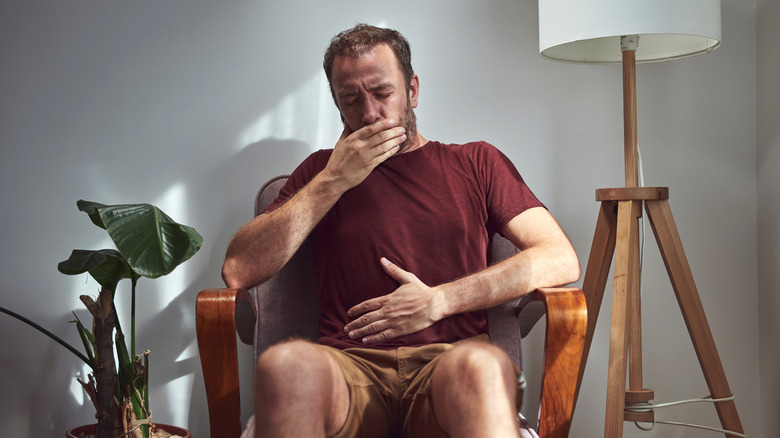
What Happens To Your Stomach If You Drink Too Much Alcohol? – Health Digest
A night out with friends can be fun until the next day when you realize the combination of buffalo wings and IPA wasn’t the wisest decision. Your head feels like it’s in a vice from alcohol’s dehydrating effects, and your stomach feels like Mount Vesuvius.
Your stomach handles a lot on a day-to-day basis, breaking down foods through its gastric juices so your body can absorb important nutrients. The glands in your stomach lining produce mucus that protects your stomach wall from too much acid. When you drink too much alcohol, you’re disrupting the balance of acid and alkaline in your stomach.
“Alcohol irritates and erodes the lining of the stomach and increases acid release,” Taylor C. Wallace, Ph.D., CEO of Think Healthy Group, LLC, told Health Digest. “This is why people have gastric reflux in the days following heavy alcohol intake.”
While a night of drinking too much alcohol could have you swearing off alcohol for good (or at least until next weekend), drinking too much over time can lead to serious consequences not only for your stomach but also for other organs in your body.
Too much alcohol can cause gastritis
Depending on your sex, age, and food intake, your body typically metabolizes a single alcoholic drink within an hour. A standard drink in the United States is considered to be a 12-ounce beer (5%) alcohol, a 5-ounce glass of wine (12% alcohol), or a 1.5-ounce shot of distilled spirits (40% alcohol). “Moderate alcohol intake is considered one drink for women and two drinks for men per day (and you can’t save them all up for Saturday night),” Wallace said.
When you drink more than what your body can metabolize, more alcohol reaches your bloodstream and brain, affecting your thinking and movement. Your stomach might get sick for one night, but Wallace said frequently drinking too much can erode your stomach lining, causing alcoholic gastritis.
Gastritis isn’t just about temporary acid reflux. Because your stomach lining is worn down, you might feel constant pain or bloating in your stomach, especially when you eat. This might cause you to lose your appetite. You could also feel yourself burping or hiccuping more often. Gastritis might also show up as blood in your vomit or poop as your stomach lining bleeds.
Drinking too much can also damage other organs
Because your body considers alcohol to be a toxin, it quickly goes to work to eliminate it from your body. Two enzymes in your body break down the alcohol molecule into acetaldehyde, which is toxic to the body. Although acetaldehyde is short-lived in your body before it’s converted into acetate, Wallace said acetaldehyde can cause inflammation in your liver, GI tract, brain, and other organs.
“Excessive chronic alcohol intake has been linked to an increased risk of mortality, certain types of cancers, CVD, and a whole host of other health issues,” Wallace said. Specifically, long-term heavy drinking can create chemical imbalances in certain neurocircuits in your brain and damage cognitive functions such as learning, memory, and impulse control, according to the National Institute on Alcohol Abuse and Alcoholism. Drinking too much alcohol can also cause problems with your cardiovascular system such as arrhythmias, stroke, and high blood pressure. The National Cancer Institute says that alcohol is considered to be carcinogenic, meaning it can cause cancer. Heavy alcohol use is linked with cancers of the head and neck, esophagus, liver, breast, colon, and rectum.
If you or anyone you know needs help with addiction issues, help is available. Visit the Substance Abuse and Mental Health Services Administration website or contact SAMHSA’s National Helpline at 1-800-662-HELP (4357).





